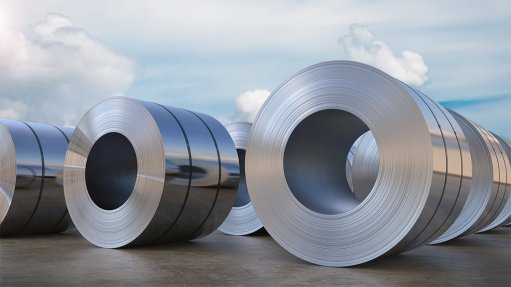
Global crude steel production for the 63 countries reporting to the World Steel Association increased by 6.6% year-on-year to 158.5-million tonnes in July.
Africa witnessed a surge in production to 1.4-million tonnes, marking a 26.1% increase compared with July 2022.
Meanwhile, Asia and Oceania contributed significantly with production of 119.9-million tonnes, reflecting a 9.1% year-on-year increase.
Within the European Union (EU), production reached 10.3-million tonnes, which represented a dip of 7.1%. In contrast, other non-EU European countries experienced positive momentum, delivering 3.6-million tonnes, which marked a rise of 5.1%.
The Middle East, on the other hand, experienced a decline, producing 3.1-million tonnes, representing a decrease of 3.9%. Similarly, North America's production amounted to 9.4-million tonnes, showing a more modest decline of 1.2%.
The region encompassing Russia and other Commonwealth of Independent States (CIS), in addition to Ukraine, showcased a robust performance, collectively producing 7.4-million tonnes, signifying a substantial increase of 9.3%.
Meanwhile, South America faced a slight setback, producing 3.4-million tonnes, experiencing an 8.4% reduction year-on-year. This diverse landscape of production figures in various regions contributes to a nuanced understanding of the global production trends during this period.
The 63 countries reported on accounted for about 97% of total world crude steel production in 2022.
China emerged as the leading global steel producer, with production of 90.8-million tonnes in July, marking an 11.5% increase compared with July 2022. India secured the second spot by producing 11.5-million tonnes, achieving 14.3% growth year-on-year.
In the line-up, Japan held its ground with production of 7.4-million tonnes, displaying a modest 0.9% uptick.
The US contributed a total of 6.9-million tonnes, reflecting a slight 0.5% increase, while Russia's estimated production amounted to 6.3-million tonnes, showcasing 5.8% growth.
Meanwhile, South Korea encountered a production decline of 9%, reaching 5.7-million tonnes.
Germany, with its production of three-million tonnes, experienced a modest reduction of 0.5%. Türkiye, on the other hand, demonstrated growth, producing 2.9-million tonnes, marking an increase of 6.4%.
Brazil, with its production of 2.7-million tonnes, faced a 4.7% decrease, while Iran's production reached two-million tonnes, reflecting a 1.5% reduction.